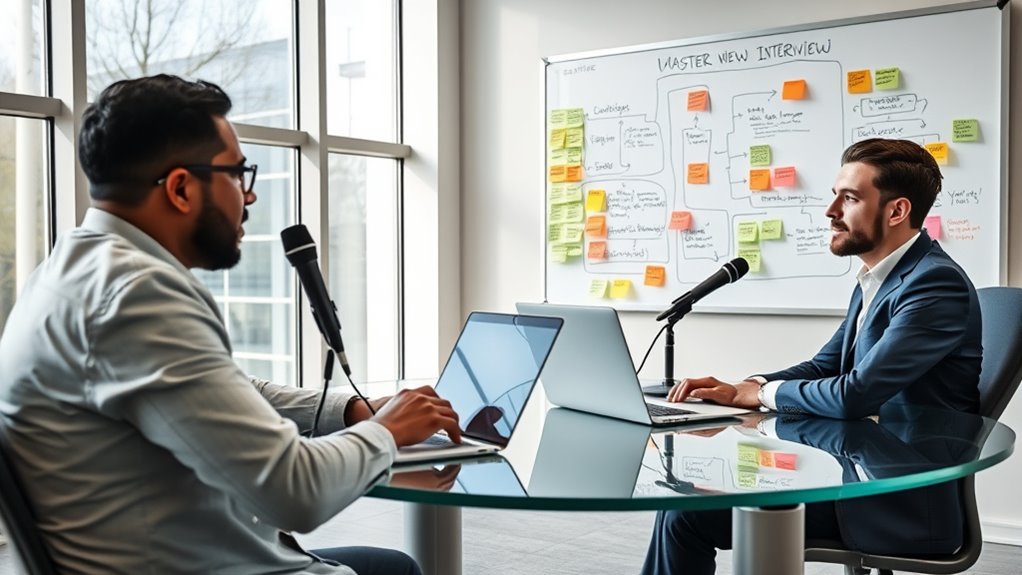To win with expert interviews, develop a clear, repeatable workflow that starts with selecting knowledgeable experts aligned with your goals. Prepare focused, open-ended questions and reach out professionally, scheduling interviews flexibly. During interviews, listen actively, take notes or record with permission, and ask follow-up questions. Immediately review your insights and organize them systematically. Continually refine your approach and share findings to inform your strategy—mastering this process will help you access valuable industry insights.
Key Takeaways
- Select knowledgeable experts and prepare focused, open-ended questions to elicit detailed insights.
- Reach out professionally, schedule flexibly, and create a comfortable environment for open dialogue.
- Take notes or record with permission, actively listen, and ask clarifying questions during the interview.
- Immediately review and organize insights, highlighting patterns, surprises, and key themes for analysis.
- Share findings with your team, incorporate insights into strategies, and refine your workflow continuously.

Have you ever wondered how to efficiently gather valuable insights from industry experts? The key lies in establishing a solid, repeatable workflow for conducting expert interviews. A well-structured process not only saves you time but also guarantees you extract the most relevant and actionable information. To start, you need to identify the right experts—those with deep, firsthand knowledge of your target topics. Prioritize quality over quantity by selecting individuals whose expertise aligns closely with your project’s goals. Once you’ve pinpointed your interview subjects, prepare thoughtful questions that are open-ended but focused. Craft your questions to explore specific challenges, trends, or opportunities, avoiding vague or overly broad queries. This preparation shows respect for their time and encourages detailed, insightful responses.
Establish a repeatable workflow to gather expert insights efficiently and effectively.
Next, reach out professionally with a clear explanation of your purpose and how their insights will be valuable. Be flexible with scheduling and considerate of their availability. When the interview day arrives, create a comfortable environment that fosters honest dialogue. Start with a brief introduction, setting expectations and emphasizing the confidentiality or use of their insights. During the interview, stay attentive and listen actively—don’t just stick to your script. Follow up on interesting points they raise, asking clarifying questions to deepen your understanding. Take concise notes or record the conversation (with their permission) so you can focus on the discussion rather than frantic note-taking.
After the interview, immediately review your notes while the conversation is fresh in your mind. Summarize key takeaways, highlighting new insights or unexpected perspectives. Organize your findings systematically so they’re easy to reference later. This could involve tagging themes or creating a database of expert insights. The next step involves synthesizing the data, comparing responses, and identifying common patterns or unique viewpoints. This process helps you build a thorough picture and avoid biases from a single source. Additionally, understanding the Hours Today List of local stores can help you plan your shopping trips more efficiently, saving you time and ensuring product availability. This process helps you build a thorough picture and avoid biases from a single source. Finally, share your findings with relevant team members and incorporate them into your strategic decisions or content development.
Consistency is crucial. By following this workflow repeatedly, you’ll develop a reliable system for extracting high-quality insights efficiently. Over time, you’ll refine your questions and interview techniques, becoming more adept at uncovering valuable, actionable information. This approach transforms expert interviews from a one-off task into a strategic asset that accelerates your understanding of industry trends, customer needs, and competitive landscapes. Remember, a repeatable process not only makes your research more productive but also ensures that each interview builds upon the last, creating a continuous flow of knowledge that drives smarter decisions.
Frequently Asked Questions
How Do I Approach Hesitant or Unresponsive Experts?
You should start by acknowledging their hesitation and showing genuine respect for their time. Send a polite, personalized message explaining why you value their expertise and how it can benefit them. Offer flexible scheduling options and assure confidentiality if needed. If they remain unresponsive, follow up with brief, spaced-out reminders. Sometimes, building rapport over time or providing a clear, easy way to connect encourages hesitant experts to engage.
What Tools Can Streamline the Interview Scheduling Process?
Imagine your calendar as a well-tuned orchestra, each tool a conductor guiding harmony. Use scheduling apps like Calendly or Doodle to automate invitations and find mutually available times effortlessly. These tools sync with your calendar, send reminders, and reduce back-and-forth emails. You’ll streamline your interview process, freeing up time to focus on crafting insightful questions. Embrace these digital conductors to turn chaos into a symphony of seamless scheduling.
How Do I Handle Conflicting Information From Different Experts?
When you encounter conflicting information from experts, first evaluate each source’s credibility and context. Cross-check facts with reputable references, and look for patterns or consensus among multiple experts. Don’t hesitate to ask clarifying questions or seek additional opinions if needed. Keep an open mind, and remember that differing perspectives can enrich your understanding. Ultimately, synthesize the insights to form a balanced, well-informed conclusion.
What Are Best Practices for Anonymizing Sensitive Expert Insights?
You should treat sensitive insights like gold; protect them carefully. Use pseudonyms or generic titles instead of real names, and remove any identifying details from transcripts or summaries. Store the information securely, with access limited to essential personnel. Always get explicit consent from experts about how their insights will be used and anonymized. This way, you safeguard confidentiality while respecting their trust and maintaining integrity in your work.
How Can I Measure the Impact of Expert Interviews on My Project?
You can measure the impact of expert interviews by tracking how their insights influence your project decisions and outcomes. Look for tangible changes such as improved strategies, increased efficiency, or better stakeholder engagement. Additionally, gather feedback from your team to assess how valuable they find the interviews. Monitoring key performance indicators before and after integrating expert advice helps you quantify their contribution to your project’s success.
Conclusion
Think of your expert interviews as planting a garden. Each question is a seed, carefully nurtured with curiosity and trust. With patience and a clear workflow, those seeds grow into rich insights, blossoming into compelling stories. Stay consistent with your approach, and soon you’ll harvest a bounty of knowledge that elevates your work. Master this rhythm, and you’ll turn every interview into a flourishing garden of expertise, ready to inspire and inform.









